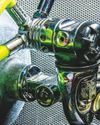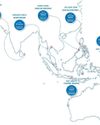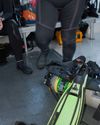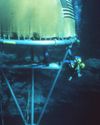Conservation International reveals how an “accidental” forest saved a village from a super-typhoon, and has helped revitalise the local fishery.

It all started with an earthquake
It was not out of the ordinary when the ground began to tremble in the fishing barangay (village) of Silonay, Philippines, on November 15, 1994: Part of the Pacific Ocean’s “Ring of Fire,” the Philippines is no stranger to earthquakes. But in the months after the temblor, something strange happened – mangrove seedlings began to sprout up along the muddy banks of the nearby river that emptied out to the ocean.
Before the earthquake, a few mangroves grew near the ocean’s edge, but most of the coast was bare. Whenever typhoons hit and the storm surge rose, the river flooded the town. Just over two decades later, the former stretch of mud is now a thriving mangrove forest.
Climate change is already being felt across the globe, making growing seasons less predictable, raising sea levels and exacerbating extreme weather events such as typhoons and droughts. Adapting to this new reality is critical – and in small towns like Silonay, where poverty is chronic and man-made solutions few and far between, protecting Nature may be the easiest, cheapest way to do it. In fact, it has already saved people from catastrophe.
The new reality
Separating mainland Luzon and the island of Mindoro, the Verde Island Passage is known for its spectacular range of marine life, from whale sharks to sea turtles to record numbers of coral species. These waters also provide food, income from tourism and other benefits for more than seven million people, including the 1,400 residents of Silonay.
When mangroves began growing here, the villagers didn’t quite know what to do with them. Ever resourceful, people began to use the trees for what they could. “[People] cut them down,” said Silonay resident Alma Bool. “They used them as firewood.”
هذه القصة مأخوذة من طبعة Issue 02-2017 (108) من Scuba Diver.
ابدأ النسخة التجريبية المجانية من Magzter GOLD لمدة 7 أيام للوصول إلى آلاف القصص المتميزة المنسقة وأكثر من 9,000 مجلة وصحيفة.
بالفعل مشترك ? تسجيل الدخول
هذه القصة مأخوذة من طبعة Issue 02-2017 (108) من Scuba Diver.
ابدأ النسخة التجريبية المجانية من Magzter GOLD لمدة 7 أيام للوصول إلى آلاف القصص المتميزة المنسقة وأكثر من 9,000 مجلة وصحيفة.
بالفعل مشترك? تسجيل الدخول

The Making Of A World Record-Breaking Diver
Descending more than 300 metres into the depths of the ocean may sound like a daunting prospect to even the most seasoned diver. But to one man, it was just another a challenge that he set for himself to see how far he was able to push the envelope.

Risk Mitigation: Hose Failure
An unexpected outcome

Top 10 Wrecks Of Asia-Pacific
We present a curated list of the top 10 most famous wrecks found in the Asia-Pacific region, listed in no particular order

From The Medical Line: Diving After DCS
DAN medical information specaialists and researchers answer your dive medicine questions

Cave Exploration: Beginning With The End In Mind
Building complex adventures on simple skills

Dive Slate: Stay Safe On Board
When preparing for a dive, safety is at the top of the list – checking gear, learning potential site hazards and discussing procedures with your divemaster or buddy.

101 Tips On Becoming A Better Tek Diver
Technical diving takes divers beyond the typical recreational scuba diving limits, opening up many new and exciting possibilities.

TECHNICAL DIVING TIMELINE (1660–1999)
It’s fair to say that the emergence of “technical diving” in the late 1980s, that is, the introduction of mixed gas technology, and later mixed gas rebreathers to the sport diving community, represented the culmination of hundreds of years of scientific discovery and technological development.

FLYING AFTER DIVING
From the Safety Stop

DIAGNOSING DECOMPRESSION ILLNESS
Incident Insight